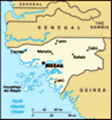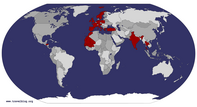Advertisement
Published: August 7th 2007
On the map, Senegal and Gambia look like the profile of an open mouth where the former are the jaws while the latter represents the tongue. Made exception for the short coastal strip, the Gambia is totally wrapped in Senegal, hence whichever direction one wants to leave the country -south in my case- he have to necessarily enter into the territory of its francophone neighbour.
I have understood by now that in this part of the world even the most insignificant trip can take a whole day and that therefore one must show up at la gare routiere (bus station) at the most indecent morning hours so to avoid the chance to be left stranded at dusk in some god forgotten border shack. The reason why travelling before dawn is perfectly fine while do it after dusk is considered unsafe goes beyond my plain western logic. But like many other aspects of the African daily life, is a fact to be accepted without trying to find an explanation using the Pythagorean table for it.
The quality of the roads seems to go worse and worse as travelling towards south: from paved with a few potholes in Senegal to potholed
with odds chunks of asphalt in Gambia (tourist zone apart, where roads are as good as a Formula 1 circuit) to totally unpaved in Guinea Bissau. And the arrival of the rainy season doesn’t surely help to improve things. Some roads are in such a state of deterioration that motorists prefer to leave the track and drive in the ditch, with the car lining at a 30° angle rather than to stress themselves in a continuous anti-hole slalom. The problem arises when they stumble into someone coming the other way who had the same idea and in these cases one of the two vehicles must re-enter the official road. Nevertheless I have recently discovered that the worst roads are also the safest here, the only ones on which edges you don’t see carcasses, neither animals nor cars (but then again, maybe they get removed to allow circulation in the ditch). In fact, while on these crumbling roads everybody is forced down to low cruise speeds, on the paved ones it seems like being in a world of lunacy where an unwritten code containing only two articles rules: 1) it’s forbidden to lift the foot from the accelerator; 2) it’s compulsory
to overtake any vehicle, specially trucks and possibly just before blind curves.
The range of public transports is made up of, from the most economic to the most expensive: bus, minivan and taxi brousse. The first one has capacity for approximately 40 people plus as many animals as they manage to stuff into the aisles and on the roof, it usually get used by peasants, leaves when it can, arrives if it can. Minivans are normally wrecks with four rows of seats and capacity for 10 passengers apart from the driver according to the manufacturer, 14 plus the driver according to local rule. Contrarily to what happens for the bus, minivans are essentially used by small traders hence the presence of animals is replaced by goods of inanimate kind. They tend to be the favourites among policemen when it comes to chose where to lift tips from. Taxi brousse, finally, are peugeot 504 station wagon (1968) with an extra row of seats added in the trunk so to allow the car to (un)comfortably carry 7 passengers plus the driver. As for minivans, they do not have fixed departure timetables, they just have a fixed route and leave off as
soon as all the seats got sold.
Bissau, my next destination, lies just 310 Kms away from Banjul, but is also a trip involving two river and -not less problematic fact in Africa- two border crossings. Trying to cover the whole length in a single leg would mean spending an eternity on the road, quarrelling in one single day with border guards from three different countries (in three different languages) and above all denying the indispensable African philosophy of
l’homme tranquille. Beside, southern Senegal can offer world class beaches… why not recovering beforehand from potential future travelling stress?
After a few wonderful days spent at Cap Skirring, I resume my journey to Guinea. In Ziguinchor, Cassamance administrative headquarter, I find a taxi brousse heading to Bissau and, after bargaining the fare with the car owner, I purchased my ticket. The taxi driver swears that within two hours we will arrive to destination. It would have been an average speed of 90 Km/h and, in case the lunatic had indeed meant what he had said, I could very well have slid my wrists rather than getting on his car. In reality, we left at 11am and reached Bissau only
at sunset. Sharing the car with me there was, among others, a Guinean army officer who was returning to Bissau along with his wife and his wonderful little daughter Deborah, a tiny black doll two years old wrapped in an immaculate, fluffy white dress. It gave pain to look at her suffering heat and dehydratation during the seven hours journey. The man was from Nigeria, so it came to me spontaneously to ask him how a foreigner could become officer in the army. “Many things are possible in Africa, my friend” he had answered. However, his presence had avoided me loads of problems with the several army patrols who stopped us along the way.
Bissau seems to be Dakar nemesis: if that is a megalopolis made of narrow lanes insufficient for its intense traffic, this is a little town with wide, empty tree-lined Soviet style avenues. If in Dakar you cannot walk a step without feeling pressed to buy a wooden camel or to contract the absolutely indispensable services of an
official guide, here the idea of bothering the rest of humanity is the last one that would come to the minds of those groups of men lining against
the walls while enjoying the evening freshness. Have you in mind Steinbeck’s
Tortilla flat? Bissauans are the most similar you can find to that book’s characters. Space, personal space, here is what characterizes this city and which I had badly missed in Dakar (and in smaller amount in Banjul).
On a different level, the city suffers from continuous power black-out, public lighting is practically nonexistent and running water is a chimera. Nevertheless, the apartments hosting the too many NGO workers present here offer all amenities from hot water to air conditioned. Which is like saying: we come here to help you because we want to create a world of equals, but before starting let’s make clear that we remain more… equals! Needless to say, here as anywhere else in the world, the massive presence of UN and NGO employees makes prices skyrocket to levels of pure physical pain. Remembered the calculation made about Senegal (see
Strange News from a Different Planet)? Guinean figures simply dwarf them.
After a bit of enquiring, I had known about the existence of a former casino that could perhaps let rooms. Arguably the cheapest bet in town. The manager, and only employee, is called Latif. The day I
would start my own business, those like Latif would be first against the wall, but until that day will not see its dawn, these are my true heroes and source of inspiration. As a reminder of the fact that the hotel has seen better days, my room offers clear indications of faded luxury: slot-machine, air-conditioned (neither of them working) and bathroom (with no water) en suite. Plus a terrace all for myself with tree branches grown in the years inside it and among the various parts of its stone balustrade. I am the only customer and Latif, apart from inviting me for lunch and accepting a sweater as currency, has always a reason to leave the premises: “a lady-friend of mine is in town, my friend”, “I go fishing with my cousins” or any excuse in order to get lost. And when he does he just let me the keys of the whole building, nightclub (a pure gem of kitsch that look as just time transported from the 70s) and bar included!
This is the Africa I love, the one I was looking for, the one that knows how to find the positive side even in a daily routine made of hardships. The one which knows how to smile even if living in a city still full of the scars of another of our wars (ours inasmuch as we produce the weapons those wars are fought with). The one where a white man is just a man, not a toubab in need of being alighted of a few dollars. The one that, probably, will soon disappear under the blows of good intentions (but with air-con) of those who always have something to be forgiven for.
ITALIANO La versione italiana di questo blog la trovi sul sito Vagabondo.net
Link:
Spazi Vuoti
Advertisement
Tot: 0.107s; Tpl: 0.012s; cc: 13; qc: 36; dbt: 0.0554s; 1; m:domysql w:travelblog (10.17.0.13); sld: 1;
; mem: 1.2mb














Tim
non-member comment
Excellent
Another great entry....the pic depicting the peugeot 504 actually brings back memories of my childhood...funny how certain things don't change...anywayz, looking forward to the next entry, which hopefully will be sooner rather than later